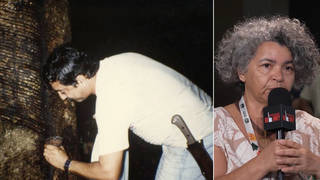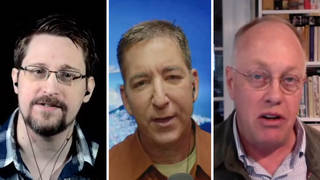
Guests
- Jesselyn Radackformer ethics adviser to the United States Department of Justice. She is currently director of National Security & Human Rights at the Government Accountability Project, the nation’s leading whistleblower support organization.
Four journalists who revealed the National Security Agency’s vast web of spying have been awarded the 2013 George Polk Awards in Journalism. Glenn Greenwald, Laura Poitras, Ewen MacAskill of The Guardian and Barton Gellman of The Washington Post were among the winners announced on Sunday. Even as the journalists who broke the stories based on Edward Snowden’s leaks were awarded one of journalism’s highest honors, a lawyer who represents Snowden was recently detained while going through customs at London’s Heathrow Airport. Jesselyn Radack joins us today to tell her story. Radack says she was subjected to “very hostile questioning” about Snowden and her trips to Russia. Radack also learned she might be on an “inhibited persons list,” a designation reportedly used by the U.S. Department of Homeland Security to require further vetting of certain passengers. Radack is just one of a growing number of people who are being stopped, harassed and interrogated for their work around Snowden, WikiLeaks and National Security Agency documents. Radack is the director of National Security & Human Rights at the Government Accountability Project, the nation’s leading whistleblower support organization.
Transcript
NERMEEN SHAIKH: Four journalists who revealed the National Security Agency’s vast web of spying have been awarded the 2013 George Polk Awards in Journalism. Glenn Greenwald, Laura Poitras, Ewen MacAskill of The Guardian and Barton Gellman of The Washington Post were among the winners announced on Sunday. Even as the journalists who broke the stories based on Snowden’s leaks were awarded one of journalism’s highest honors, a lawyer who represents Snowden was detained while going through customs at London’s Heathrow Airport. Jesselyn Radack told Firedoglake she was subjected to, quote, “very hostile questioning” about Snowden and her trips to Russia. Radack also learned she might be on an inhibited persons list, a designation reportedly used by the U.S. Department of Homeland Security to require further vetting of certain passengers. After the Polk Awards were announced, Glenn Greenwald tweeted, quote, “In the UK government, this is known as the George Polk Award for Excellence in Terrorism.”
Jesselyn Radack is just one of a growing number of people who are being stopped, harassed and interrogated for their work around Edward Snowden, WikiLeaks and National Security Agency documents. In this clip, we hear from journalist Laura Poitras, computer security researcher Jacob Appelbaum, and then journalist Glenn Greenwald’s partner David Miranda, who have all been stopped and interrogated in airports.
LAURA POITRAS: I’ve actually lost count of how many times I’ve been detained at the border, but it’s, I think, around 40 times. And on this particular trip, lately they’ve been actually sending someone from the Department of Homeland Security to question me in the departing city, so I was questioned in London about what I was doing. I told them I was a journalist and that, you know, my work is protected, and I wasn’t going to discuss it.
JACOB APPELBAUM: I was targeted by the U.S. government and essentially, until the last four times that I’ve flown, I was detained basically every time. Sometimes men would meet me at the jetway, similarly, with guns.
DAVID MIRANDA: [translated] I stayed in a room with three different agents that were entering and exiting. They spoke to me, asking me questions about my whole life. They took my computer, my video game, cellphone, everything.
AMY GOODMAN: That was journalist Glenn Greenwald’s partner David Miranda; before him, computer security researcher Jacob Appelbaum and journalist Laura Poitras. You can go to our website to see our interview with Jacob Appelbaum and Laura Poitras at democracynow.org. But all of them have been interrogated at airports, as has most recently Jesselyn Radack, the attorney representing Edward Snowden, joining us from London. She is a former ethics adviser to the U.S. Department of Justice under George W. Bush, currently director of National Security & Human Rights at the Government Accountability Project, the nation’s leading whistleblower organization.
Jesselyn, welcome back to Democracy Now! Describe what happened at Heathrow on Sunday.
JESSELYN RADACK: I was trying to enter through customs, which at Heathrow is called the Border Force, and I was directed to a very specific station rather than the regular line. And after the first question, which is, “Why are you here?” which is a normal question, things just got more bizarre as we went along. I said that I was here to see friends. They wanted me to be more specific. I said, “In the Sam Adams Association,” the group that awarded Edward Snowden the award last year—I didn’t add that part. And then they asked for the names of the people in the group. And so I gave names of people who are publicly known to be members. And then they asked where we were meeting, and I said at the Ecuadorean embassy. And they asked, “With Julian Assange?” And I said, “Yes.” But then, at that point, I was asked why I had been to Russia twice in the past three months. And I said, “Because I have a client there.” And they asked, “Who?” And I said, “Edward Snowden.” And then, this was the most bizarre thing: They said, “Who is Edward Snowden?” And I just said matter-of-factly, “He is a whistleblower and an asylee.” They next asked, “Who is Bradley Manning?” And I said, “A whistleblower. And then they asked, “Where is Bradley Manning?” And I said, “In jail.” And he said, “So, he’s a criminal.” And I said that he’s a political prisoner. And then they said, “But you represent Snowden.” And I said, “Yes, I’m a human rights attorney, and I’m one of his legal advisers.”
But I found that entire line of questioning very jarring and very unnerving. I didn’t know what kind of answer I was supposed to give. I mean, obviously, it’s like asking, “Who is President Obama?” They’re asking about some of the most famous people on the planet. Obviously, I have an attorney-client relationship to protect. I’m not going to get into meetings that I’ve had with clients. And only some of my clients are public, Edward Snowden being one of them, so that’s why I could answer that question. But I walked away from the interview just shaking. During the interview, I was fine. I maintained my composure. But I walked away just shaking and just upset. I just cried. It was very intimidating and very, very, again, unnerving to be asked that line of questions as an attorney. And I don’t think journalists or attorneys should be harassed or intimidated at the border, and it’s very disturbing to me that this has occurred in the U.S. and the U.K., and I’ve heard that this happened to someone recently in Germany, though I don’t know the details of that. But certainly, as an attorney, having gone to 14 different countries in the past year, I have never endured a line of questioning like that. You get the usual, “Hi. Why are you here? Who are you seeing? Where are you staying?” But not, “Who do you—who is Edward Snowden? Where is Edward Snowden? Where is Bradley Manning? Do you represent Bradley Manning?” which I wouldn’t even be allowed to answer, obviously, because that would be attorney-client privileged information. I, in fact, do not represent him, but it would have put me in a really difficult situation of actually making a false statement if I did represent him and had to answer a question like that.
NERMEEN SHAIKH: Jesselyn, could you talk about the significance of the inhibited persons list? How did you first learn about it, and are you in fact on it?
JESSELYN RADACK: As hard—as a graduate or an alumnus of the no-fly list, you’re never officially told, “You are on this list.” It’s implied, and you hear it. This apparently is some list maintained in Great Britain, but originating from the Department of Homeland Security. And I wish I could tell you more about it, but that’s just what I was able to learn from speaking with other people who have had difficulty getting out of the U.K. My difficulty was getting in. I’m hoping I don’t have any difficulty getting out. But an inhibited persons list, to me, is another kind of watch list, just like how ridiculous it was that I spent a number of years on the no-fly list, when I obviously posed no direct threat. To Snowden, I’m an attorney doing my job, and being a human rights lawyer does not pose any kind of immigration violation or safety threat to entering the United Kingdom, so I’m not sure why I was subjected to that interrogation other than to try to intimidate me from doing my job.











Media Options